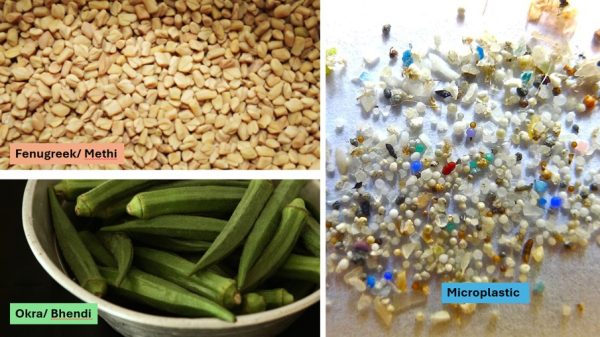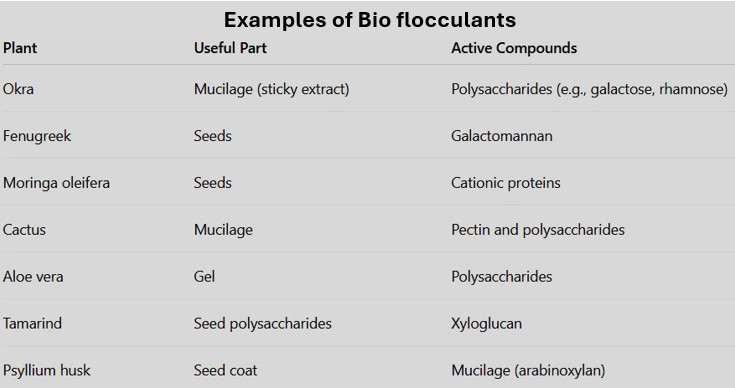
Extracts From Okra And Fenugreek Can Remove Most Microplastic From Water
Recent research has demonstrated that natural polysaccharide extracts from okra and fenugreek can effectively remove microplastics from water, offering a sustainable and non-toxic alternative to conventional chemical flocculants.
Before proceeding to research details, it is important to understand what these plant-based flocculants and how they work.
Plant-based flocculants are natural substances derived from plants that help remove suspended particles—like microplastics, sediments, or contaminants—from liquids, especially water. They do this by causing the particles to clump together (a process called flocculation), making it easier to filter out or settle.
Characteristics of plant-based flocculants:
- Natural origin: Made from polysaccharides (complex sugars), proteins, or other biopolymers found in plants.
- Eco-friendly: Biodegradable and non-toxic, unlike many chemical flocculants such as aluminum sulfate or polyacrylamide.
- Safe for drinking water: Suitable for use in water purification for human consumption.
Common sources of plant-based flocculants:

How do flocculants work?
- The flocculant is added to turbid water.
- It binds to fine particles (like microplastics or silt).
- The particles clump together into larger “flocs.”
- These flocs are heavy enough to settle out or be filtered easily.
Benefits of using flocculants:
- Sustainable alternative to chemical flocculants.
- Reduce environmental toxicity.
- It can be sourced locally in many regions, lowering treatment costs.
Research on Okra and Fenugreek as flocculants:
Researchers at Tarleton State University, led by Dr. Rajani Srinivasan, tested polysaccharide extracts from various plants—including okra, fenugreek, tamarind, Aloe vera, cactus, and Psyllium species—for their ability to capture microplastics in water.
Dr. Rajani Srinivasan: “The whole treatment method with the non-toxic materials uses the same infrastructure, we don’t have to build something new to incorporate these materials for water treatment purposes.”
Optimal combinations:
- Sliced okra and fenugreek seeds were used in this research.
- A combination of okra and fenugreek extracts was most effective in removing microplastics from ocean water.
- Okra paired with tamarind extracts worked best for freshwater samples.
- These natural polymers performed better than synthetic ones.
Mechanism of action: The plant-based polysaccharides function as flocculants, binding to microplastic particles and causing them to aggregate and settle out of the water. Dried extracts of okra and fenugreek removed 67% and 93% microplastics respectively, in an hour. A combination of both resulted in 70% removal of microplastics in 30 mins.
Compatibility with existing infrastructure: These natural flocculants can be integrated into current water treatment systems without the need for new equipment or processes.
The research team plans to further refine the ratios and combinations of plant-based flocculants to optimize microplastic removal across various water sources, including ocean water, estuaries, freshwater, and groundwater. They also aim to scale up the process for field studies and eventual industrial application.
References:
- https://springwise.com/sustainable-infrastructure/water-and-sanitation/removing-microplastics-from-water-with-okra/
- https://www.tarleton.edu/news/tarleton-researchers-work-to-remove-microplastics-from-wastewater/
- https://www.waterworld.com/wastewater-treatment/press-release/14270277/food-grade-plant-extracts-remove-microplastics-from-wastewater
- https://www.makewaterfamous.com/news/scientists-cook-up-novel-way-to-remove-microplastics-from-water
Image credit: https://pxhere.com/en/photo/674746 & https://pxhere.com/en/photo/4818 (both images are CC0 For Public Domain), Microplastic: Oregon State University, CC BY-SA 2.0 <https://creativecommons.org/licenses/by-sa/2.0>, via Wikimedia Commons
Author: Sumana Rao | Posted on: May 16, 2025
« Harit Yoga Campaign To Promote Personal And Planetary Health Kisan Know Device Costing Rs. 85 Help Farmers To Detect Crop Disease In Advance »






















Write a comment